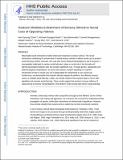| dc.contributor.author | Choe, Han Kyoung | |
| dc.contributor.author | Reed, Michael Douglas | |
| dc.contributor.author | Benavidez, Nora | |
| dc.contributor.author | Montgomery, Daniel P | |
| dc.contributor.author | Soares, Natalie | |
| dc.contributor.author | Yim, Yeong Shin | |
| dc.contributor.author | Choi, Bohyun Gloria | |
| dc.contributor.author | Choe, Han Kyoung | |
| dc.contributor.author | Reed, Michael Douglas | |
| dc.date.accessioned | 2016-09-13T16:48:15Z | |
| dc.date.available | 2016-09-13T16:48:15Z | |
| dc.date.issued | 2015-07 | |
| dc.date.submitted | 2015-05 | |
| dc.identifier.issn | 08966273 | |
| dc.identifier.uri | http://hdl.handle.net/1721.1/104096 | |
| dc.description.abstract | Meaningful social interactions modify behavioral responses to sensory stimuli. The neural mechanisms underlying the entrainment of neutral sensory stimuli to salient social cues to produce social learning remain unknown. We used odor-driven behavioral paradigms to ask if oxytocin, a neuropeptide implicated in various social behaviors, plays a crucial role in the formation of learned associations between odor and socially significant cues. Through genetic, optogenetic, and pharmacological manipulations, we show that oxytocin receptor signaling is crucial for entrainment of odor to social cues but is dispensable for entrainment to nonsocial cues. Furthermore, we demonstrate that oxytocin directly impacts the piriform, the olfactory sensory cortex, to mediate social learning. Lastly, we provide evidence that oxytocin plays a role in both appetitive and aversive social learning. These results suggest that oxytocin conveys saliency of social stimuli to sensory representations in the piriform cortex during odor-driven social learning. | en_US |
| dc.description.sponsorship | National Science Foundation (U.S.) (Graduate Research Fellowship, grant 1122374) | en_US |
| dc.description.sponsorship | National Research Foundation of Korea (Basic Science Research Program) | en_US |
| dc.description.sponsorship | Human Frontier Science Program (Strasbourg, France) (Postdoctoral fellowships, LT000692/2014-L) | en_US |
| dc.description.sponsorship | National Institute of Mental Health (U.S.) (award number R01MH106497) | en_US |
| dc.description.sponsorship | Massachusetts Institute of Technology. Simons Center for the Social Brain (seed grant (020362-056)) | en_US |
| dc.language.iso | en_US | |
| dc.publisher | Elsevier | en_US |
| dc.relation.isversionof | http://dx.doi.org/10.1016/j.neuron.2015.06.022 | en_US |
| dc.rights | Creative Commons Attribution-NonCommercial-NoDerivs License | en_US |
| dc.rights.uri | http://creativecommons.org/licenses/by-nc-nd/4.0/ | en_US |
| dc.source | PMC | en_US |
| dc.title | Oxytocin Mediates Entrainment of Sensory Stimuli to Social Cues of Opposing Valence | en_US |
| dc.type | Article | en_US |
| dc.identifier.citation | Choe, Han Kyoung, Michael Douglas Reed, Nora Benavidez, Daniel Montgomery, Natalie Soares, Yeong Shin Yim, and Gloria B. Choi. “Oxytocin Mediates Entrainment of Sensory Stimuli to Social Cues of Opposing Valence.” Neuron 87, no. 1 (July 2015): 152–163. | en_US |
| dc.contributor.department | Massachusetts Institute of Technology. Department of Brain and Cognitive Sciences | en_US |
| dc.contributor.department | McGovern Institute for Brain Research at MIT | en_US |
| dc.contributor.mitauthor | Choe, Han Kyoung | |
| dc.contributor.mitauthor | Reed, Michael Douglas | |
| dc.contributor.mitauthor | Benavidez, Nora | |
| dc.contributor.mitauthor | Montgomery, Daniel P | |
| dc.contributor.mitauthor | Soares, Natalie | |
| dc.contributor.mitauthor | Yim, Yeong Shin | |
| dc.contributor.mitauthor | Choi, Bohyun Gloria | |
| dc.relation.journal | Neuron | en_US |
| dc.eprint.version | Author's final manuscript | en_US |
| dc.type.uri | http://purl.org/eprint/type/JournalArticle | en_US |
| eprint.status | http://purl.org/eprint/status/PeerReviewed | en_US |
| dspace.embargo.terms | N | en_US |
| dc.identifier.orcid | https://orcid.org/0000-0001-7849-7094 | |
| dc.identifier.orcid | https://orcid.org/0000-0002-3179-5980 | |
| dc.identifier.orcid | https://orcid.org/0000-0001-9196-7302 | |
| dc.identifier.orcid | https://orcid.org/0000-0003-4050-8338 | |
| mit.license | PUBLISHER_CC | en_US |
| mit.metadata.status | Complete | |
